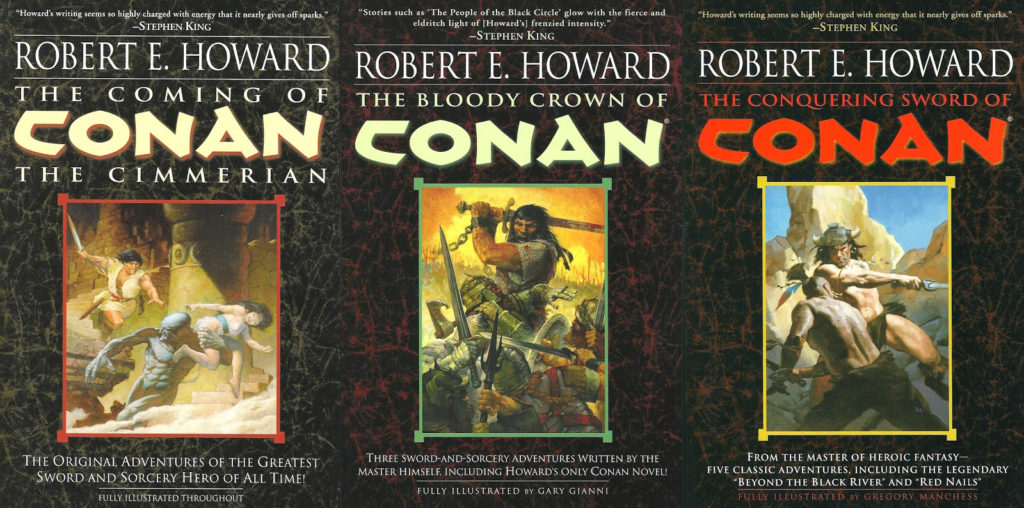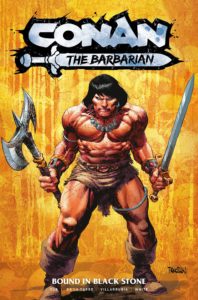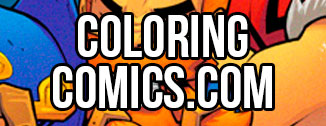
Continuing my Conan reread for Cimmerian September, the fourteenth published Conan story is Beyond the Black River, which originally serialized in the May and June issues of Weird Tales magazine in 1935.
Our story opens by introducing a new character who will be sharing the spotlight with our Cimmerian.
He was a young man of medium height, with an open countenance and a mop of tousled tawny hair unconfined by cap or helmet. His garb was common enough for that country—a coarse tunic, belted at the waist, short leather breeches beneath, and soft buckskin boots that came short of the knee. A knife-hilt jutted from one boot-top. The broad leather belt supported a short, heavy sword and a buckskin pouch. There was no perturbation in the wide eyes that scanned the green walls which fringed the trail. Though not tall, he was well built, and the arms that the short wide sleeves of the tunic left bare were thick with corded muscle.
His name is Balthus and he’s a settler in Conajohara, a new Aquilonian province established by annexing land from the Picts. Unexpectedly, he’s established with the same kind of heroic countenance we normally only get for Conan himself, which creates a different dynamic from many of the other canon stories.
Don’t get me wrong, Conan is still our title character and isn’t upstaged:
The other emerged dubiously and stared at the stranger. He felt curiously helpless and futile as he gazed on the proportions of the forest man—the massive iron-clad breast, and the arm that bore the reddened sword, burned dark by the sun and ridged and corded with muscles. He moved with the dangerous ease of a panther; he was too fiercely supple to be a product of civilization, even of that fringe of civilization which composed the outer frontiers.
The words “savage”, “barbarian”, and civilization work overtime in this story. Black River drills to the core of Robert E. Howard’s theme of Civilization vs Savagery, as we see the differences and similarities between the Aquilonian settlers, the Pict warriors, and Conan, currently working for the Aquilonians but also most comfortable in the natural world.
Conan is a scout at Fort Tuscelan, right on the border of Conajohara and the Pictish wilderness. The fort is border defense and has been bearing the brunt of Pict attacks for many weeks. Even as Conan works for Aquilonian coin, he senses how foolish and futile this struggle is:
“Some day they’ll try to sweep the settlers out of Conajohara. And they may succeed—probably will succeed. This colonization business is mad, anyway. There’s plenty of good land east of the Bossonian marches. If the Aquilonians would cut up some of the big estates of their barons, and plant wheat where now only deer are hunted, they wouldn’t have to cross the border and take the land of the Picts away from them.”
As Balthus and Conan talk about the situation, we learn about the Battle of Venarium, a pivotal moment in young Conan’s life:
“But some day a man will rise and unite thirty or forty clans, just as was done among the Cimmerians, when the Gundermen tried to push the border northward, years ago. They tried to colonize the southern marches of Cimmeria: destroyed a few small clans, built a fort-town, Venarium—you’ve heard the tale.”
“So I have indeed,” replied Balthus, wincing. The memory of that red disaster was a black blot in the chronicles of a proud and warlike people. “My uncle was at Venarium when the Cimmerians swarmed over the walls. He was one of the few who escaped that slaughter. I’ve heard him tell the tale, many a time. The barbarians swept out of the hills in a ravening horde, without warning, and stormed Venarium with such fury none could stand before them. Men, women, and children were butchered. Venarium was reduced to a mass of charred ruins, as it is to this day. The Aquilonians were driven back across the marches, and have never since tried to colonize the Cimmerian country. But you speak of Venarium familiarly. Perhaps you were there?”
“I was,” grunted the other. “I was one of the horde that swarmed over the walls.”
The Battle of Venarium has become important to several Conan pastiche stories, including my own, acting as a bit of an ‘origin point’ for the characters, showing him in his first battle. We showed Venarium in Conan the Barbarian #0, our Free Comic Book Day issue:

Conan and Balthus find a corpse and realize that the man has been slain by a swamp demon summoned by Zogar Sag, a Pict Shaman with terrifying powers. When that demon uses its illusionary powers to sound like a woman in danger, Balthus is ambushed and Conan narrowly saves him:
Looking over his shoulder, Balthus felt his hair stand up stiffly. Something was moving through the deep bushes that fringed the trail—something that neither walked nor flew, but seemed to glide like a serpent. But it was not a serpent. Its outlines were indistinct, but it was taller than a man, and not very bulky. It gave off a glimmer of weird light, like a faint blue flame. Indeed, the eery fire was the only tangible thing about it. It might have been an embodied flame moving with reason and purpose through the blackening woods.
Conan snarled a savage curse and hurled his ax with ferocious will. But the thing glided on without altering its course. Indeed it was only a few instants’ fleeting glimpse they had of it—a tall, shadowy thing of misty flame floating through the thickets. Then it was gone, and the forest crouched in breathless stillness.
Conan and Balthus finally return to Fort Tuscelan to make their report and the commander asks Conan to lead a strike force to sneak into enemy territory and slay the shaman. Balthus insists on being part of the unit and Conan agrees. As this hand-picked group of warriors silently make their way down river we assume they’re going to kick ass, but the narrative takes a solid swerve:
The man did not reply. Wondering if he had fallen asleep, Balthus reached out and grasped his shoulder. To his amazement, the man crumpled under his touch and slumped down in the canoe. Twisting his body half about, Balthus groped for him, his heart shooting into his throat. His fumbling fingers slid over the man’s throat—only the youth’s convulsive clenching of his jaws choked back the cry that rose to his lips. His finger encountered a gaping, oozing wound—his companion’s throat had been cut from ear to ear.
In that instant of horror and panic Balthus started up—and then a muscular arm out of the darkness locked fiercely about his throat, strangling his yell. The canoe rocked wildly. Balthus’ knife was in his hand, though he did not remember jerking it out of his boot, and he stabbed fiercely and blindly. He felt the blade sink deep, and a fiendish yell rang in his ear, a yell that was horribly answered. The darkness seemed to come to life about him. A bestial clamor rose on all sides, and other arms grappled him. Borne under a mass of hurtling bodies the canoe rolled sidewise, but before he went under with it, something cracked against Balthus’ head and the night was briefly illuminated by a blinding burst of fire before it gave way to a blackness where not even stars shone.
The Picts completely ambush our heroes and Balthus is knocked out. When he wakes up, he’s tied up in the Pict camp and all of the warriors on the mission are dead except for Conan, who managed to dive to safety, and one other prisoner, who is about to have a really bad day with a sabretooth tiger summoned by Zogar Sag:
Full on the woodsman’s breast it struck, and the stake splintered and snapped at the base, crashing to the earth under the impact. Then the saber-tooth was gliding toward the gate, half dragging, half carrying a hideous crimson hulk that only faintly resembled a man. Balthus glared almost paralyzed, his brain refusing to credit what his eyes had seen.
In that leap the great beast had not only broken off the stake, it had ripped the mangled body of its victim from the post to which it was bound. The huge talons in that instant of contact had disemboweled and partially dismembered the man, and the giant fangs had torn away the whole top of his head, shearing through the skull as easily as through flesh.
Conan comes to Balthus’ rescue, but now they have to make their getaway, stay hidden as they cross through enemy territory thick with warriors, warn the fort that a major attack is coming, and try to evacuate the nearest Aquilonian settlement before it’s too late.
I won’t spoil how it all plays out, just know that it’s Howard channeling some of his most powerful prose, thick with dark atmosphere and action while waxing philosophical about the nature of duty and sacrifice, man and beast:
“Barbarism is the natural state of mankind,” the borderer said, still staring somberly at the Cimmerian. “Civilization is unnatural. It is a whim of circumstance. And barbarism must always ultimately triumph.”
Beyond the Black River was adapted in Savage Sword of Conan #26 and 27, with art by John Buscema and Tony Dezuniga.


If you haven’t read the original Conan prose stories, I recommend the Del Rey 3-book set, which has each story unedited and essays that add context around their publication.







 Zub on Amazon
Zub on Amazon Zub on Instagram
Zub on Instagram Zub on Twitter
Zub on Twitter
0 Comments.